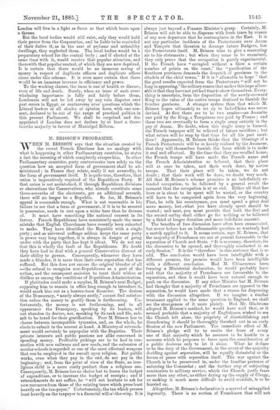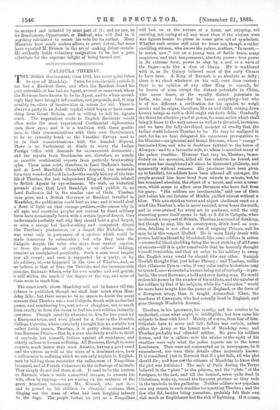M. BRISSON'S PROGRAMME.
WHEN M. BRISSON says that the situation created by the recent French Elections has no analogy with what is happening in other Parliamentary countries, he states a fact the meaning of which completely escapes him. In other Parliamentary countries, party controversies turn solely on the question how an accepted form of government shall be ad- ministered ; in France they relate, really if not avowedly, to the form of government itself. It is quite true, therefore, that union is imperatively required of the Republican Party. If that union is not maintained, if through Republican divisions or abstentions the Conservatives, who already constitute some three-sevenths of the electorate, get an additional seventh,
there will no longer be a Republic. So far, M. Brisson's appeal is reasonable enough. What is not reasonable is his failure to see that a form of government, if it is to be secured in possession, needs to rest upon a wider base than he dreams of. It must have something like national consent in its favour. French Republicans have consistently made the same mistake that English Churchmen have recently been exhorted to make. They have identified the Republic with a single party ; and as universal suffrage seldom keeps the same party in power very long together, it is always in danger of going under with the party that has kept it afloat. We do not say that this is wholly the fault of the Republicans. No doubt they have had to deal with a general Conservative distrust of their ability to govern. Consequently, whenever they have made a blunder, it is more than their own reputation that has suffered. But this does not excuse the original blunder of all —the refusal to recognise non-Republicans as a part of the nation, and the consequent omission to treat their wishes or dislikes as among the conditions of Republican Administration.
If platitudes could make a surplus, M. Brisson's next Budget, supposing him to remain in office long enough to introduce it, would mark him out as a heaven-born financier. The desires of the Democracy, "nearly always costly," cannot find satisfac- tion unless the money to gratify them is forthcoming. Un- fortunately, the money is not forthcoming, and to all appearance the Demoeracy, speaking by its leaders, will not abandon its desires, nor, speaking by its rank and file, sub- mit to be taxed for their gratification. Poor M. Brisson has to choose between incompatible tyrannies, and, on the whole, he elects to submit to the nearest at hand. A Ministry of retrench.. ment would certainly be unpopular with the Deputies. Their private interests and public passions are alike concerned in spending money. Profitable pickings are to be had in con- nection with new railways and new roads, and the extension of secular schools is regarded as one of the most effectual weapons that can be employed in the assault upon religion. But public works, even when they pay in the end, do not pay in the beginning ; and, from the point of view of the State, an irre- ligious child is a more costly product than a religious one. Consequently, M. Brisson has no choice but to lessen the budget of expenditure, or to increase the budget of receipts ; and if retrenchments do not spffice, he " will not hesitate to ask for new resources from those of the existing taxes which press least heavily on the tax-payer." Unfortunately, the tax which presses least heavily on the taxpayer is a financial will-o'-the-wisp. It is
always just beyond a Finance Minister's grasp. Certainly, M.- Brisson will not be able to dispense with fresh taxes by reason
of any new departure that he contemplates in the East. It is not any particular incidents of the Protectorate over Anam and Tonquin that threaten to derange future Budgets, but
the Protectorate itself. M. Brisson tries to give a reassuring air to his statements ; but when they come to be examined, they only prove that the occupation is purely experimental.
If the French have " occupied without a blow a certain number of points on the coast," the "pacification of the Southern provinces demands the despatch of garrisons to the citadels of the chief towns." If it is " allowable to hope " that the good results expected from the Protectorate " will not be long in appearing," the solitary reason that makes this hope allow- able is that they have not yet had time to show themselves. Every- thing is uncertain, from the disposition of the newly-crowned King to the value of the native troops destined to furnish the frontier garrisons. A stranger system than that which M. Brisson hopes ultimately to set up in Indo-China was never devised. At first there are to be two armies—an Anamite one paid by the King, a Tonquinese one paid by France ; and these two are eventually to form a single army entirely in the pay of Anam. No doubt, when this single army is formed, the French taxpayer will be relieved of future sacrifices ; but what return will he reap by that time for all his past sacri- fices ? Apparently, M. Brisson thinks that the blessings of a French Protectorate will be so keenly realised by the Anamese, that they will themselves furnish the force which is to make it real and effectual. By the time that they are recalled home, the French troops will have made the French name and the French Administration so beloved, that their place will at once be taken, and their work done, by native troops. That their place will be taken, we do not doubt ; that their work will be done, we doubt very much.
All that M. Brisson's scheme promises is an indefinitely ex- tended occupation, to be followed by a general revolt the moment that the occupation is at an end. Either all that has been or is about to be spent will be wasted, or the country will have to be conquered again from the very beginning. First, he tells his countrymen, you must spend a great deal more money, lest .what you have already spent should be wasted ; and next, you must provide that both the first and the second outlay shall either go for nothing or be followed by a third of longer duration and more indefinite amount.
The benefits of free discussion have often been enumerated. but never before has an inflammable question so wantonly had a match applied to it. It seems certain, says M. Brisson, that the majority of Frenchmen are not at present favourable to the separation of Church and State. " It is necessary, therefore, for the discussion to be opened, and thoroughly conducted in an early Session." It is the " therefore " in this sentence that is so odd. The conclusion would have been intelligible with a different premiss, the premiss would have been intelligible with a different conclusion. Had M. Clemenceau been framing a Ministerial declaration, he would probably have said that the majority of Frenchmen are favourable to the separation, and then it would have been natural enough to push on the discussion. If any other Minister but M. Brisson had thought that a majority of Frenchmen are opposed to the separation, he would have made that a reason for dispensing with the discussion altogether. If we imagine a similar treatment applied to the same question in England, we shall see the strangeness of it more plainly. Had Mr. Gladstone adopted M. Brisson's method, he would have said that, as it seemed probable that a majority of Englishmen wished to see the Church left alone, the propriety of disestablishing and disendowing it should be thoroughly threshed out in an early
Session of the new Parliament. The immediate effect of M.
Brisson's pledge will be to excite the fears of every one of that majority which he assumes to be hostile to a.
measure which he proposes to force upon the consideration of a public desirous only to let it alone. What he defines to be the duty of the Government, in the event of the majority deciding against separation, will be equally distasteful to the lovers of peace with separation itself. The war against the Church is to be persevered in, under the familiar pretence of enforcing the Concordat ; and the further step of subjecting seminarists to military service, which the Church justly fears more than any other, as either drying up the supply of Clergy, or making it much more difficult to avoid scandals, is to be hurried on.
Altogether, M. Brisson's declaration is a marvel of misapplied ingenuity. There is no section of Frenchmen that will not
be annoyed and irritated by some part of it ; and no one, be he Reactionary, Opportunist, or Radical, who will find in it anything calculated to secure his vote for its author. Many Ministers have made useless efforts to avert defeat, but none have equalled M. Brisson in the art of making defeat certain. He evidently holds voluntary resignation to be but a poor substitute for the supreme delight of being turned out.



































 Previous page
Previous page